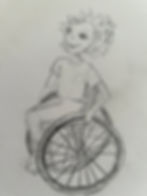Disabled Protagonists CAN Exist
- ryanraeharbuck
- Mar 21, 2025
- 3 min read
Today, while strolling through the elementary school hall, a tiny preschooler stopped me simply to say, “I like your wheelchair!”
This wasn’t the first time a kid has told me this, and it won’t be the last, but it truly doesn’t lessen the impact of such a compliment.
Moments like this whirl my mind, thinking about my mission to bring disabled main characters to books. That preschooler, whether impacted by my disability or not, deserves to see the hero have a wheelchair sometimes. We all do.
Yet, the more passionate I become, the more discouraged I remain. The protagonists have never been the ones with disabilities— think Tiny Tim, or Lieutenant Dan, or even Quasimodo. Those secondary characters exist to make you feel something, and that thing is pity. Pity for what each of them has lost or won’t ever have.
Health. Legs. Beauty.
It’s easy enough to create disabled characters in a story to make you feel their loss, but it’s entirely another can of worms when you set out to make those characters the hero.
The problem is something I have increasingly become more and more aware of as I age: People see someone with a disability as someone who has lost, not one who has gained.
Yet, I’m here to tell you that it’s just not so.
Someone with a disability has a past, and in that past, they have likely had a struggle. They have, indeed, had something taken away or don’t have something that others do. Because of this, people with disabilities have been forced to learn key skills.
They are problem solvers.
They are communicators.
They are patient.
They are champions of themselves.
In my 28 years of pushing a wheelchair, I have learned to value the perspective I’ve gained from where I sit. I’ve become someone who cherishes the sunrise and the whispered breeze on my face. I quietly thank the universe for each new day and take in all the little moments I can. I know that my life is far more valuable than it ever would have been had I not been paralyzed. You see it as something lost, but I can’t help but feel something so much more.
But now I’m here, attempting to write a protagonist—actually, many protagonists from picture books, to middle grade, to adult novels— of which you will read as the hero not despite their disability, but simply because of it. And shattering that mold is so damned hard.

It’s learning how to crawl all over again. Actually, it’s telling you to trust me and try to get you to crawl again, even though you know how to walk, and walking is easier, and why would you even listen to some wacky wheelchair woman about crawling anyway?
But, even though I cannot walk anymore, I still understand the value of learning how to crawl first. I truly do. I can’t possibly expect to change your thinking in a single chapter or weekly Substack post, but we all have to start somewhere.
You will read that chapter and think about new possibilities, and you may read another chapter more. And, then, one day, you’ll read the words The End, and perhaps you’ll smile. You may have enjoyed it, or you may have loathed it, but either way, it made you think differently about what a main character has or doesn’t have. The point of it is I want to be able to write the story so that, when it’s all said and done, you’ll accept it.
You’ll accept it and move on like it’s not such a ground-breaking concept. You’ll feel for the protagonist, you’ll relate to the story. You’ll see the hero for who they really are. Wheelchair or not.
And, then maybe someday, whether you recognize the change or not, you will see a person cruising down the hall with a wheelchair and say, “I like your wheelchair!” too.
|
%20(1).png)


